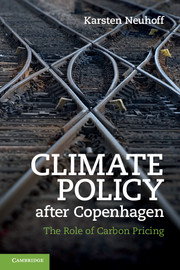Book contents
- Frontmatter
- Contents
- List of figures
- List of tables
- List of boxes
- Acknowledgements
- List of abbreviations
- 1 Introduction
- 2 The role of a climate policy mix
- 3 Implementing a carbon price: the example of cap and trade
- 4 Shifting investment to low-carbon choices
- 5 Co-operation among developed countries: a role for carbon markets?
- 6 A world of different carbon prices
- 7 International support for low-carbon growth in developing countries
- 8 Conclusion
- References
- Index
1 - Introduction
Published online by Cambridge University Press: 05 June 2012
- Frontmatter
- Contents
- List of figures
- List of tables
- List of boxes
- Acknowledgements
- List of abbreviations
- 1 Introduction
- 2 The role of a climate policy mix
- 3 Implementing a carbon price: the example of cap and trade
- 4 Shifting investment to low-carbon choices
- 5 Co-operation among developed countries: a role for carbon markets?
- 6 A world of different carbon prices
- 7 International support for low-carbon growth in developing countries
- 8 Conclusion
- References
- Index
Summary
In the Copenhagen Accord at the UN climate negotiations in Copenhagen, 117 heads of state concluded that low-emissions development would be necessary in order to combat climate change. However, at the end of a two-year negotiation marathon, they could not agree on emissions targets. In the following months, eighty-three countries submitted proposals to the United Nations Framework Convention on Climate Change (UNFCCC) secretariat for nationally appropriate mitigation actions (NAMAs), thus supporting the Accord and gradually rebuilding momentum for international climate co-operation.
One major challenge for the negotiations in Copenhagen was the shift of emphasis from marginal emissions reductions to low-carbon development. This is illustrated by the discussions on support mechanisms for climate policy in developing countries.
The Kyoto Protocol defined an international off-setting approach, the clean development mechanism (CDM): large emitters in developed countries can finance individual projects to reduce greenhouse gas emissions in developing countries if this is cheaper than reducing their own emissions (UNFCCC 1997). In this way, the cost of achieving the Kyoto emissions targets for the period 2008–2012 are reduced, but so are incentives to pursue more-ambitious mitigation actions in developed countries. As projects are directly supported within this international mechanism, domestic policy makers in developing countries have only limited involvement.
The Copenhagen Accord of 2009 emphasises the role of low-emissions development strategies. It invites developing countries to submit descriptions of NAMAs they envisage using for the implementation of these strategies. The Accord outlines technology co-operation and finance mechanisms to provide international support for their implementation.
- Type
- Chapter
- Information
- Climate Policy after CopenhagenThe Role of Carbon Pricing, pp. 1 - 18Publisher: Cambridge University PressPrint publication year: 2011



